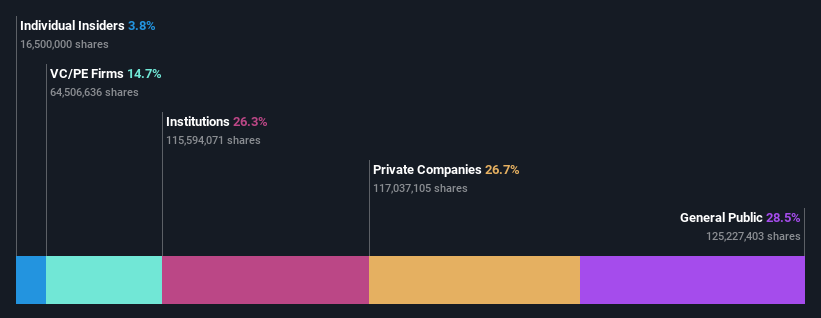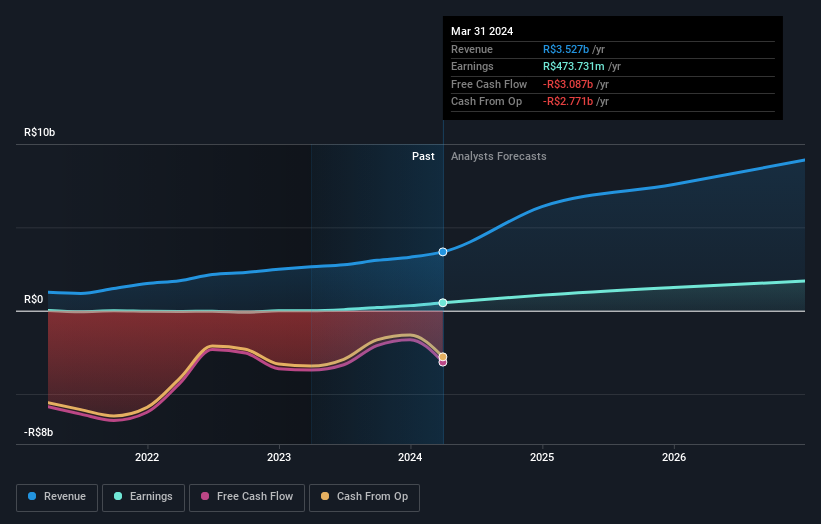Retail investors are Inter & Co, Inc.'s (NASDAQ:INTR) biggest owners and were rewarded after market cap rose by US$197m last week
Key Insights
Significant control over Inter & Co by retail investors implies that the general public has more power to influence management and governance-related decisions
53% of the business is held by the top 4 shareholders
If you want to know who really controls Inter & Co, Inc. (NASDAQ:INTR), then you'll have to look at the makeup of its share registry. The group holding the most number of shares in the company, around 29% to be precise, is retail investors. In other words, the group stands to gain the most (or lose the most) from their investment into the company.
As a result, retail investors were the biggest beneficiaries of last week’s 7.9% gain.
In the chart below, we zoom in on the different ownership groups of Inter & Co.
View our latest analysis for Inter & Co
What Does The Institutional Ownership Tell Us About Inter & Co?
Many institutions measure their performance against an index that approximates the local market. So they usually pay more attention to companies that are included in major indices.
As you can see, institutional investors have a fair amount of stake in Inter & Co. This implies the analysts working for those institutions have looked at the stock and they like it. But just like anyone else, they could be wrong. It is not uncommon to see a big share price drop if two large institutional investors try to sell out of a stock at the same time. So it is worth checking the past earnings trajectory of Inter & Co, (below). Of course, keep in mind that there are other factors to consider, too.
Inter & Co is not owned by hedge funds. Costellis International Limited is currently the largest shareholder, with 27% of shares outstanding. With 15% and 7.3% of the shares outstanding respectively, SBLA Advisers Corp. and Squadra Investments – Gestao de Recursos Ltda. are the second and third largest shareholders.
On looking further, we found that 53% of the shares are owned by the top 4 shareholders. In other words, these shareholders have a meaningful say in the decisions of the company.
While studying institutional ownership for a company can add value to your research, it is also a good practice to research analyst recommendations to get a deeper understand of a stock's expected performance. There are plenty of analysts covering the stock, so it might be worth seeing what they are forecasting, too.
Insider Ownership Of Inter & Co
The definition of company insiders can be subjective and does vary between jurisdictions. Our data reflects individual insiders, capturing board members at the very least. Management ultimately answers to the board. However, it is not uncommon for managers to be executive board members, especially if they are a founder or the CEO.
Insider ownership is positive when it signals leadership are thinking like the true owners of the company. However, high insider ownership can also give immense power to a small group within the company. This can be negative in some circumstances.
We can report that insiders do own shares in Inter & Co, Inc.. This is a big company, so it is good to see this level of alignment. Insiders own US$100m worth of shares (at current prices). It is good to see this level of investment by insiders. You can check here to see if those insiders have been buying recently.
General Public Ownership
The general public, who are usually individual investors, hold a 29% stake in Inter & Co. This size of ownership, while considerable, may not be enough to change company policy if the decision is not in sync with other large shareholders.
Private Equity Ownership
With a stake of 15%, private equity firms could influence the Inter & Co board. Sometimes we see private equity stick around for the long term, but generally speaking they have a shorter investment horizon and -- as the name suggests -- don't invest in public companies much. After some time they may look to sell and redeploy capital elsewhere.
Private Company Ownership
We can see that Private Companies own 27%, of the shares on issue. It's hard to draw any conclusions from this fact alone, so its worth looking into who owns those private companies. Sometimes insiders or other related parties have an interest in shares in a public company through a separate private company.
Next Steps:
It's always worth thinking about the different groups who own shares in a company. But to understand Inter & Co better, we need to consider many other factors. For example, we've discovered 2 warning signs for Inter & Co that you should be aware of before investing here.
If you are like me, you may want to think about whether this company will grow or shrink. Luckily, you can check this free report showing analyst forecasts for its future.
NB: Figures in this article are calculated using data from the last twelve months, which refer to the 12-month period ending on the last date of the month the financial statement is dated. This may not be consistent with full year annual report figures.
Have feedback on this article? Concerned about the content? Get in touch with us directly. Alternatively, email editorial-team (at) simplywallst.com.
This article by Simply Wall St is general in nature. We provide commentary based on historical data and analyst forecasts only using an unbiased methodology and our articles are not intended to be financial advice. It does not constitute a recommendation to buy or sell any stock, and does not take account of your objectives, or your financial situation. We aim to bring you long-term focused analysis driven by fundamental data. Note that our analysis may not factor in the latest price-sensitive company announcements or qualitative material. Simply Wall St has no position in any stocks mentioned.
Have feedback on this article? Concerned about the content? Get in touch with us directly. Alternatively, email editorial-team@simplywallst.com

 Yahoo Finance
Yahoo Finance 

